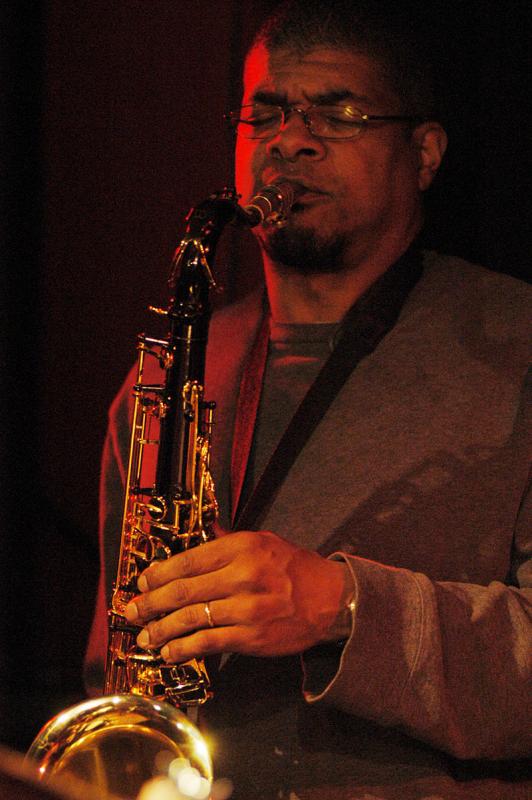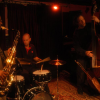Home » Jazz Articles » Profile » Jeff Robinson: Rare Bird Sighting
Jeff Robinson: Rare Bird Sighting
 Jeff Robinson hails from St. Louis and moved to Boston to attend Berklee College of Music. To create his one-person play, Live Bird, which is based on the life of Charlie Parker, Robinson creatively draws from his experiences in acting, music and poetry.
Jeff Robinson hails from St. Louis and moved to Boston to attend Berklee College of Music. To create his one-person play, Live Bird, which is based on the life of Charlie Parker, Robinson creatively draws from his experiences in acting, music and poetry.
In the world of jazz, few musicians are as iconic as Parker. Parker, known as Bird, came of age in Kansas City during the Great Depression—a time when shady politics, bootleg liquor and gambling created an environment in which jazz would thrive. During the 1920s, the vaudeville acts in which Parker's father had performed began to fade as a form of entertainment. In their place, something new began to emerge. Glowing, neon tubes sparked and buzzed venue names in electric light, and inside the venues, some of the era's leading jazz musicians could find regular employment. At places like the Sunset Cafe and the Reno, Parker heard music rooted in blues traditions that used rhythmic figures and contained long melody lines. The sound would become known to a broader audience as Kansas City Swing. These musical influences, along with Parker's desire to discover new sounds, would forge a driving presence in jazz.
When Parker died on March 12, 1955, he had a performance scheduled in Boston. "That's sort of the whole Boston connection," Robinson explained. Bird at the Hi-Hat (1954, Blue Note), Charlie Parker at Storyville (1954, Blue Note) and Boston (1996, Uptown), contain live recordings from Boston performances.
"Charlie Parker was sort of a one man show," Robinson explained. "He did sort of revolutionize and define modern jazz. Dizzy Gillespie should get some credit for that too, but I would say that Charlie Parker was the spearhead of the bebop movement, which in turn lead to other great movements in jazz."
A telephone, a bar top, two tables and a makeshift stage comprise the performance area for Live Bird. Dressed in a gray suit, Robinson made his entrance while playing an alto saxophone. His fingers worked the horn's keys, producing fast phrasings and scattered squawks that wove together to form Parker's "KoKo." Robinson described "Koko" as "[Parker's] variation on the song 'Cherokee.' It's a very difficult piece—somewhat of a signature song. When he recorded it, it became popular almost immediately. His solo was revolutionary, emphasizing the changes at a high speed."
Shortly after completing the opening piece, Robinson scanned the audience, focused his attention on one particular woman and then moved closer to recite a poem. While he uses this element of the play to stir audience reaction, Robinson acknowledges the approach can produce inconsistent results. He recounted incidents where the poem encouraged one woman to give him her phone number, and another where it angered a woman's boyfriend. "That's part of what makes each show fun," Robinson said, laughing.
Rather than focusing simply on music, Live Bird, provided slivers of insight into Parker's more personal side. We heard Parker talk to a bar owner who tried hustling him about payment for a performance. We heard Parker in a heated phone conversation pertaining to family matters. We heard Parker talk to fellow musician Art Blakey, who had come on hard times. And we heard Parker play jazz. Looking through these disparate windows, we obtained a view of the larger picture; Robinson brought to life the personal struggles of 1940s jazz musicians with realistic imagery.
As the play unfolded, the character Robert Simpson, a writer from a prominent jazz publication, gets introduced as a way to let Parker speak. As if answering questions for an interview, Parker was able to tell his story. With honesty and emotion, Robinson convincingly recounted the hardships and anecdotes that helped shape Parker's life. Through the ensuing conversation, we hear stories pertaining to musicians on the Southwest music scene, like Hot Lips Page, Count Basie, The Clouds of Joy, Ben Webster and Lester Young. Parker's mind raced—Bird bummed a smoke from a member of the audience and then drank whiskey while quoting the Qur'an. He discussed jamming with his mentor, Buster Smith, the use of altered chords, changing melody lines, and then he played "You Came To Me From Out of Nowhere."
Bird reflected on how he dropped out of Lincoln High School, emphasizing that colored schools didn't have much to offer, and free thought should define a human being. He affectionately referred to his education at Reno University, so named after the Kansas City club that hosted after-hours jam sessions that lingered until dawn. Eventually, Bird even hinted at his failing health—heart pains and ulcers—brought on by drug use. His parting words to Simpson were cold and hard: "Stay clean."
After Bird stepped away from Simpson, a passing patron requested an autograph. Bird solemnly stared at the audience, grasping his alto saxophone. Almost reluctantly, the notes of "Parker's Mood" rang out as Robinson exited the stage, leaving only sound as the musician's signature for everyone present.
Selected Discography
Jeff Robinson Trio, The Lizard Lounge Poetry Jam: Eleventh Anniversary (Poetry Jam Collective, 2008)
Jeff Robinson Trio, Getting Fixed (Honey Boo Records, 1998)
< Previous
Home
Comments
About Jeff Robinson
Instrument: Saxophone
Related Articles | Concerts | Albums | Photos | Similar ToTags
For the Love of Jazz
 All About Jazz has been a pillar of jazz since 1995, championing it as an art form and, more importantly, supporting the musicians who create it. Our enduring commitment has made "AAJ" one of the most culturally important websites of its kind, read by hundreds of thousands of fans, musicians and industry figures every month.
All About Jazz has been a pillar of jazz since 1995, championing it as an art form and, more importantly, supporting the musicians who create it. Our enduring commitment has made "AAJ" one of the most culturally important websites of its kind, read by hundreds of thousands of fans, musicians and industry figures every month.























